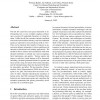92 search results - page 11 / 19 » Implicit Training of Virtual Agents |
IDEAL
2000
Springer
14 years 1 months ago
2000
Springer
Observational learning algorithm is an ensemble algorithm where each network is initially trained with a bootstrapped data set and virtual data are generated from the ensemble for ...
CA
2002
IEEE
14 years 2 months ago
2002
IEEE
The last few years have seen great maturation in understanding how to use computer graphics technology to portray 3D embodied characters or virtual humans. Unlike the off-line, an...
AAAI
2010
13 years 11 months ago
2010
Constructing models of mobile agents can be difficult without domain-specific knowledge. Parametric models flexible enough to capture all mobility patterns that an expert believes...
CIA
1999
Springer
14 years 2 months ago
1999
Springer
Abstract. Evaluations of distances or similarity measurements are very important in cooperative problem solving with multiple agents. Distance between problems is used by agents to...
IJVR
2008
13 years 9 months ago
2008
The main goals of using simulations and Virtual Environments for Training/Learning (VET/L) are to avoid risks and unwanted consequences, to reduce training costs, and to promote tr...

